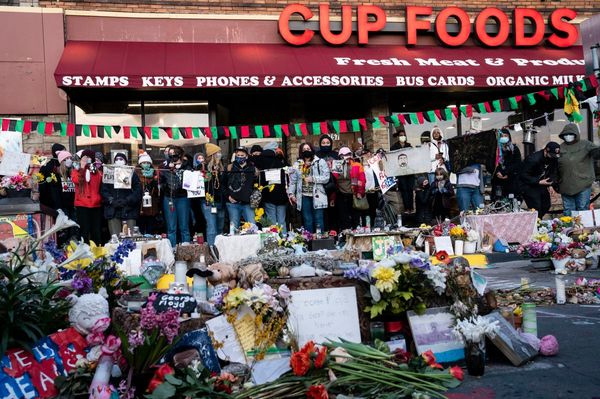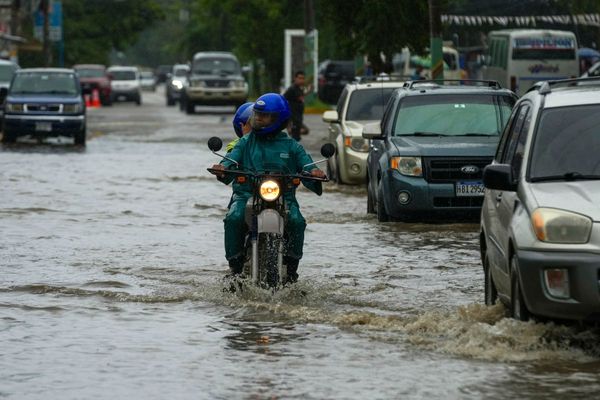
US authorities are warning of what’s gathering off the Florida coast: a giant rotating fury of wind and fog, larger than any seen for decades, with the capacity to destroy everything in its path. Yes, it’s Hurricane Milton (Milton?), and it is the largest metaphor to threaten America for some time.
“Milton is a category-five metaphor,” the Met, the US Metaphorical Service, has declared. “The combination of being a destructive force made purely of motion, with a vacuum at its centre, created by the very forces of modernity we have used to free us from nature, may be more than the political-cultural system can stand.”
“Milton will most likely disturb the system. Following the metaphor, please expect a blizzard of half-formed comparisons, analogies and denials to blanket the landscape. Which is not actually a landscape. It’s a metaphor.”
What hath God wrought? Another hurricane close to any election (it’s no mystery; the vote occurs during the very height of hurricane season), one far more powerful than has been seen for a while, and with the resources of the target state, Florida, even less capable of dealing with it.
Cuba, also in the Caribbean “Hurricane Alley”, is capable of moving millions of people from one end of the island to the other with a few hours’ notice. Florida has now had a series of Republican administrations and is no longer a swing state. Such governments have steadily reduced taxes and services to the point where the entirely predictable becomes the exceptional. Any major disaster now leaves this part of the US in a state as if there were no state, and it is everyone for themselves.
But this isn’t out of old-skool indifference by leaders to the plight of their citizenry. It is a more alarming phenomenon: the sincere desire to enact systemic measures to respond to a threat, in a period when the system has been deconstructed so severely it can no longer manage the basic functions of modernity.
Powerful, as I say. As Metaphor Milton takes Florida apart, Hurricane Election is taking the United States apart. Or threatening to. A convicted felon and soft insurrectionist is running against a Black woman, born in the year of the Civil Rights Act. Her party has been the party of unions, workers, the rural poor, the Black community and much of the Latino community. Yet she is running neck-and-neck with a man whose once hip-speaking style has now entered its “free jazz” era with no discernable relation to an actual tune, whose administration failed to deliver last time, and whose terrifying hard “free”-market, capital-friendly manifesto is out there for all to see.
Trump now looks certain to lose the nationwide popular vote. But he may still win the electoral college, bringing it home in Georgia, Arizona and Pennsylvania, the election turning on a few thousand votes. There remains voter suppression of the marginalised through voter ID, across numerous swing states, and removal of voting rights for ex-felons, including minor drug convictions.
In Georgia, the entire state voting apparatus has been taken over by Trumpists, and they control numerous counties and state offices elsewhere. They have introduced a flurry of laws to complicate, halt or render impossible the full count of a state vote. The widespread and unspoken determination that they will, if necessary, stop a vote going Harris’ way reflect the system coming to destroy itself. It’s not a single vagrant metaphor but two elements coming together in a, hmm, “perfect storm”. Interesting idea, how come no-one’s thought of that before?
The dual system can be put most simply this way. The US was founded on a revolution that aspired to legitimise itself based on ideas of the rights of a universal human individual, lacking, in principle, any other affiliations and coming together with others through contractual agreement to surrender some autonomy to a central authority established by a revolutionary process.
The US is not the only country with a revolution at its heart, but it is the only one with the ideal of an abstract, consenting or not-consenting individual. The only way such an atomised arrangement can hold together for any length of time is if there is an unspoken and non-abstract substance surrounding it; the warm air through which the storm moves.
From the 1780s to around 1910, that was the dual force of whiteness — the idea that Black people, even after emancipation, were not real Americans — and the frontier and the possibility of land. With that, the US could culturally withstand the huge immigration influx from 1865 to 1924, which undermined its Anglo-Celtic dominant ethnoculture. But that meant a re-heightening of the race border between Black and white, with Jim Crow laws — until these too were legally overturned in 1964 amid what was really a second liberal revolution.
It is this revolution that is the cause of the current transformation of politics. When the first liberal revolution occurred — the 1776 one — a whole lot of categories were relatively stable due to the limits of nature, travel, communications, etc. Society was more important than the individual in making social life, race was essential, men and women were not in question as fundamental categories, and so on.
The revolution thus had limits it did not have to impose on its spread and its transformation of everyday life. But when the second liberal revolution came along, those limits were rapidly falling away. The drafters of the First Amendment thought calls to insurrection should be protected by it; no-one thought pornography, or advocacy of abortion, should be.
One could multiply such unseen limits many times, as one has seen them fall away one by one over the past six decades. Such a new regime of life has become the home, the ground, of the newly tertiary educated groups, just as it has made those outside that feel homeless and ungrounded in their own country. The system has generated its own category-five storm.
But the storm isn’t Donald Trump. It’s the liberal onslaught that people see him standing against. He is the fragments people are shoring up against their ruin, to quote another self-promoting Yankee rich boy. The ruin is a “hyperliberalism”, which is perceived as making every aspect of life political, and thus making life unlivable — if “living” is a synthesis of the assumed, familiar and customary, sitting beneath the contested and novel.
That is why these elections have come to seem more of a fight for life, even more so than elections that pitted political-economic leftism and modernisation such as FDR’s New Deal. Even though the systemic and structural differences in policy were much greater, the common agreement was deeper on what life was, even among enemies.
That has gone now, and at the same time as it has gone, so too has the structural mechanisms — a post-war social democratic system oriented towards contesting unfairness — that provided an alternative source of solidarity and shared purpose and value. Historically, America is now on the coast of the wide Sargasso, and — hey, Q was right — the metaphor is coming for it.







